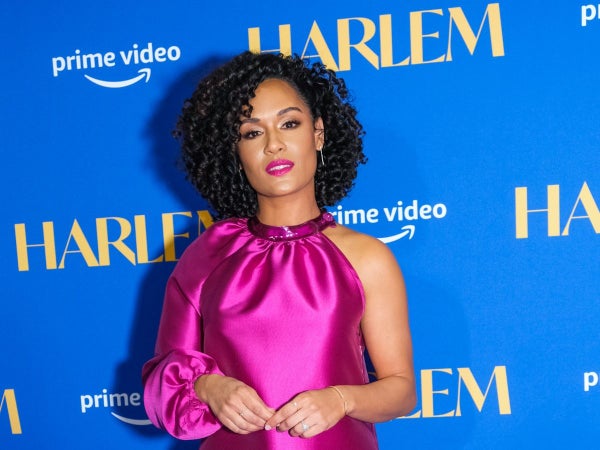 By Veronica Wells ·Updated December 3, 2021
By Veronica Wells ·Updated December 3, 2021
Actress and author Grace Byers is lending her talents to another sister circle-centered project created by writer Tracy Oliver. Harlem, which premieres on Prime video today, follows a group of four women who met in college and are now chasing their dreams in the backdrop of New York City’s historically Black enclave.
ESSENCE caught up with Byers who portrays Quinn, a Caribbean-American fashion designer struggling to keep her business afloat, in the new comedy series. We discussed what makes Harlem different from similar shows, portrayals of joy concerning Black women, and her sisterhood with the cast of the series, which includes Meagan Good, Shoniqua Shandai, and Jerrie Johnson, on and off screen.
What is it about Tracy Oliver’s writing that makes her characters so relatable and engaging for us to watch?
GRACE BYERS: Her transparency. That’s the one thing I really love about Tracy. She’s not afraid to touch on things that we wouldn’t normally want to share. Especially with the world that we live in. With social media, marketing etc.,we live in such a technical world and there’s a lot of aspects of performance and presentation. We’re really scared to show parts of ourselves that are vulnerable and that aren’t perfect, thoughts that might get us canceled or judged.
Tracy just doesn’t allow any of that to affect the way she writes. She is extremely transparent about the experience of a Black woman navigating her thirties. I think that if you’re a woman in your thirties, and particularly a Black woman–although it is not limited to that– you will absolutely find some resonance in this piece.
You said recently that with your character Anika [from Empire], there weren’t many opportunities for you to portray joy. I’m wondering if you find that things are different with Quinn.
BYERS: Absolutely. I think because of the fact that a big part of Anika’s role was to stay on the side of conflict, in those cases there were not a lot of moments of joy written for her. And if they were, they were for like an episode. Then after that, it was like ‘raarrr!’ Of course, I love dramatic roles. I come from a theater background. I don’t shirk away from those types of roles. But doing that for four years, there was a desire and yearning to round that out, to lean into some spaces of joy. I totally believe that Quinn allows me the opportunity to do that.
A lot of her circumstances are not particularly joyous but the way that she embraces and looks at life are through the lenses of optimism and with an attitude of ‘I can and I will’ provides spaces for joy.
Do you think it’s important for Black women to see portrayals of joy in our media?
BYERS: Critically important. Existing, existing honestly and existing through spaces of joy–all of that are forms of resistance in a way. We absolutely know that as women of color, there are so many branches of systemic racism. And there are ways that we are reminded to be small, not take up space. And I love the concept of joy being something that bursts through that ideology and says, I am here. I am unapologetic and I am living life in the present.
Your castmate Jerrie Johnson spoke about how well your cast got along on and off set. What do you think contributed to that rapport?
BYERS: I feel like we were all in a space of true vulnerability and excitement when it came to the show. Jerrie is spot on. She and I hit it off immediately at the call-backs. Then we met Shoniqua. And of course Meagan and I had a rapport before this. We were just so excited to be in a piece where we felt seen, where the roles represented us. The camaraderie and the idea of Black sisterhood was really exciting because we all subscribe to that. To be able to be in a space where we can live that, portray that and then potentially encourage other women and Black women to partake in that had a lot to do with us being like ‘Yes!’ as a group.
There are several different shows on networks now that feature Black friendship. What would you say is different about Harlem?
BYERS: I feel like when it comes to the history of what you’ve seen in television and in film, we see so many people who are not of color who get the opportunity to just exist and be. They get to portray things as they’re written. We are less likely and less inclined to compare. We allow them the space to do as many of those roles as they want and it doesn’t matter if there are similarities in all of those things.
I feel like simply because we are individual people, we bring a different experience to the characters we get to inhabit. That alone makes it different. If you were to interchange one of us with someone else, the dynamic would change entirely. It’s different because we’re different.
I’m really excited to play a Caribbean American character, which I don’t think you see a lot of. We see a saturation of the Caribbean culture that lives in New York and Harlem. These things that are inherently parts of who we are will set the show apart as well. Those are the isms that I have fallen in love with when it comes to Harlem.
You can begin streaming Harlem starting today, December 3 on Prime video.
TOPICS: Grace Byers harlem
The post Grace Byers Talks Sisterhood In ‘Harlem’ And The Importance Of Women Seeing Black Joy On Screen appeared first on Essence.


0 Commentaires